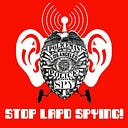Anti-Blackness and the National Security Police State that Civil Liberties Advocacy Built

As the U.S. commemorates another anniversary of the 9/11 attacks, civil liberties organizations and Muslim advocacy groups have had a lot to say about the Islamophobia of the past two decades. Islamophobia is of course a real source of violence. But far beyond the impact on Muslim communities, we must recognize post-9/11 demonization of Muslim, Middle Eastern, and South Asian populations as a strategy that the state used to expand its power against the same Black, Indigenous, and poor communities it has always policed most brutally.
This anniversary is a moment for advocacy groups to reflect critically on the policing structures that were developed using their work. It is also a moment for Muslims to reckon with anti-Blackness in their communities as well as with their deep complicity in anti-Black state violence. The reality today is that national security policing structures in the U.S. are primarily used against Black and poor communities, which of course include people who are Muslims along with far more who are not.
The harms of Muslim-focused advocacy are not just incidental. In the years that followed 9/11, Muslim advocacy groups pursued reforms that served to expand policing of Black communities, for example demanding criteria for national security surveillance that would not overtly discriminate against Muslim communities. That advocacy claimed to speak on behalf of an “impacted community” (Muslims who faced surveillance), and the goal was to reduce this community’s unique harm. But these reforms empowered police to expand surveillance on whoever’s behaviors they deem suspicious or dangerous, like through the Suspicious Activity Reporting (SAR) Initiative launched by LAPD with federal authorities in 2008.
Anyone with some awareness of U.S. policing’s history will know that giving police more power to deem everyday behavior suspicious or dangerous will expand the targeting of Black people. And this is exactly what happened in Los Angeles, where nearly a third of SARs in 2014 were filed on Black people, a rate triple the city’s Black population share. This example is of course not the first time that the work of liberal reformers have served to create new structures of anti-Black oppression: America’s entire history of racialized policing and mass incarceration is full of that. But advocacy that treats the war on terror as an anomaly or distinct from the country’s histories of genocide, enslavement, imperialism, and apartheid — all of which surveillance and policing in the U.S. are rooted in — will tend to ignore those lessons.
To be sure, some in Muslim, Middle Eastern, and South Asian communities did approach these issues intersectionally and from the perspective of Black liberation, recognizing the broader histories of harm and calling for abolition. But these voices were few and far between. And, as happens all too often, these more radical voices won far less attention and resources than those willing to compromise with police or treat the war on terror’s violence as isolated and novel.
As communities fought to abolish behavioral surveillance programs like SAR, the Obama administration flew reformist groups like the ACLU to D.C. to advise on SAR’s evolution. Thanks to that cooperation, DHS now credits the ACLU along with other “privacy, civil rights, and civil liberties advocacy groups” for helping write their counterterrorism surveillance standards, which are used by police everywhere to open secret intelligence files that get shared across local, state, and federal agencies. As a result, the federal government as well as local police agencies can now point to the blessing of those organizations to defend their racist violence.
SAR also helped law enforcement agencies build out what the federal Director of National Intelligence calls the Information Sharing Environment, a national structure for sharing the surveillance and intelligence that police go around gathering in our communities every day. Systems like this — as well as all the data collected through this surveillance — form the law enforcement infrastructure that today is being used to expand new data-driven surveillance technologies like facial recognition, biometric profiling, and “predictive” policing.
As we use this anniversary to criticize what the past two decades have built, advocacy groups are obligated to look inward and scrutinize their own work. The deeper question here must be what role did this advocacy work play in helping sanitize and strengthen U.S. imperialism, both abroad and domestically? In all the places the U.S. invaded, bombed, or destabilized in the past two decades, how has civil liberties advocacy furnished the conditions for supposedly “humane” and “legal” but endless war? And here in the U.S., what new policing structures did this work help bless?
In the year since the George Floyd uprising, we have seen Muslim advocacy groups start using the term anti-Blackness or name abolition to describe what should happen to national security policing. This lip service is not enough. In a society as white supremacist and punitive as ours, abolition requires critical thinking about every choice we have each made. It requires deep analysis of history and of our complicities. Even Muslim immigration to this country cannot be separated from the lineage of settler colonization. From this perspective, efforts to refine policing to mitigate discrimination against Muslims are attempts to assimilate into and reform the settler colony at the expense of Black and Indigenous communities.
The structures of white supremacy and imperialism that surround us will always use anything they can to preserve and expand themselves. The state is extremely adept at absorbing reformist critique in ways that strengthen and expand its power. This is as true today as it was twenty years ago. The question is what we’ve learned.
